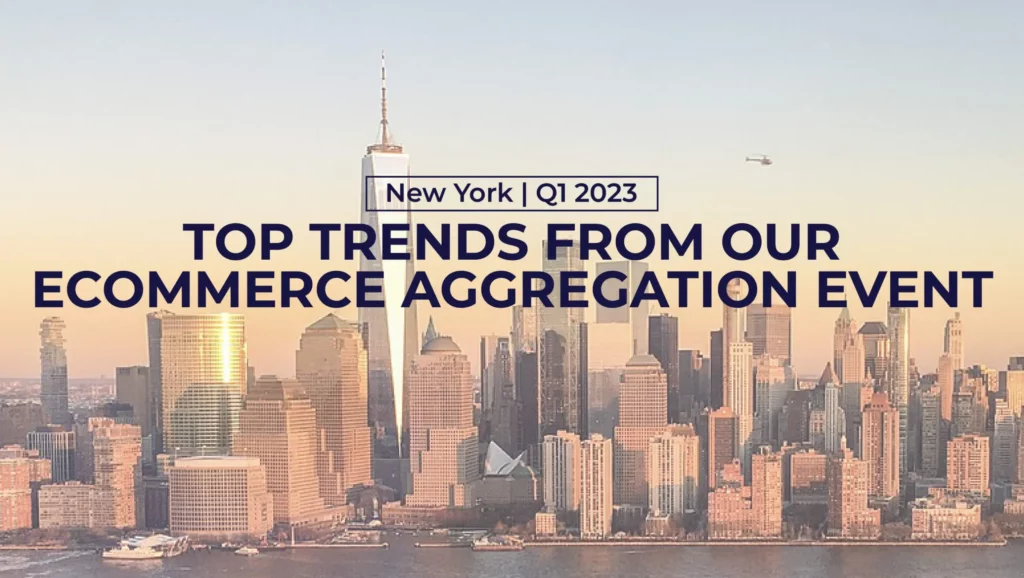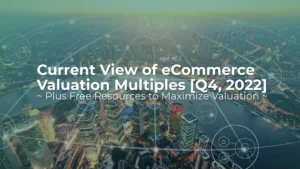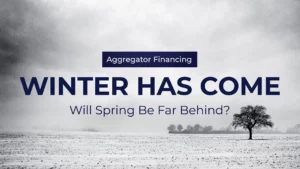Read Time: 5 Minutes
In order to provide the best M&A advisory service, it is imperative that we have the best sector and market intelligence.
To do this we regularly host exclusive thought-leader events with top eCommerce acquirors to discuss global and sector trends, and how they impact the market.
In this round-up piece we will discuss the top takeaways from our recent eCommerce Aggregation event in New York [Q1 2023], highlighting these themes:
- Focussing on Profitability.
- Prioritizing Organic Growth.
- Specializing in Fewer Categories.
- Deal Structuring with Earnouts and Equity.
- Mergers of Aggregators (MoA).
- Acquiring Chinese Brands.
- Pursuing Omnichannel Strategy.
If you are an acquiror and would like a redacted summary of our New York event, please contact us here.
Focussing on Profitability
In a bull market, businesses generally chase revenue with a strategy to increase market share. In tightening markets, there is a flight to quality resulting in increased scrutiny around profitability.
Per our annual Survey of Acquirors [Dec. 2022], buyers (incl. PE and strategics/corporates) are pursuing fewer, bigger deals in 2023.
7 out of 10 firms increased their target transaction size in 2022, and plan to increase it again in 2023.
While profitability is prioritized over revenue, naturally acquirors are looking for brands that can demonstrate healthy metrics in both.
Key criteria of top brands (or “Diamonds”) include:
- A strong brand.
- Large amount of revenue.
- Growing revenue.
- Recurring revenue.
- Net margins >15% for DTC, 20% for FBA.
- Significant growth potential.
Prioritizing Organic Growth
“If an aggregator stops M&A does the business still grow?” A question posed by the IC at a well-known investment bank highlighting the need for balance between inorganic and organic growth.
That said, there is an increased focus on operations in 2023, and driving organic growth with new product development is one strategy most acquirors are prioritizing.
Therefore, entrepreneurs seeking to maximize valuation at exit need to prepare an interesting road map of future product development that will continue to grow organically and attract top buyers.
Specializing in Fewer Categories
The benefits of category specialization can provide focus to create real operational efficiencies to boost organic growth and gain greater market share.
Furthermore, with less appetite for risk in the market, acquirors are becoming more ruthless with non-core brands, allocating fewer resources to operate them and in some cases eliminating or selling them altogether.
As a result, competition is increasing for quality assets in certain categories. As many acquirors have imposed investor constraints, we are seeing greater scrutiny around financials and what are considered add-backs informing the final consideration.
In turn, the level of preparation required of founders to ensure their business is exit ready, attracts the right buyers, navigates diligence, achieves the highest valuation, and closes has also increased.
Deal Structuring with Earnouts & Equity
In our Survey of Valuations [Q3 2022] 65% of firms were shifting the structure of deals toward deferred components like stability payments and earnouts.
In our recent Survey of Acquirors [Dec. 2022] 7 out of 10 firms expect this trend to increase in 2023 resulting in even less upfront compensation for the entrepreneur.
At a Wall Street level, earnouts have been historically problematic at best, many ending in litigation.
In light of recent lawsuits in the eCommerce aggregator space this seems to be playing out in the private market too, in one of three scenarios:
- The aggregator is in financial trouble and cannot pay the earnout.
- The brand has been poorly operated post-close, and therefore doesn’t achieve the earnout. The markets obviously factor here.
- Lack of investment post-close leads to poor performance and no earnout.
Earnouts | Revenue Vs. EBITDA
In order for earnouts to deliver, they need to be simple. Some acquirors have argued that revenue based earnouts are simpler and more transparent than earnouts based on EBITDA. The argument goes that the further down the P&L one goes, the harder it is to track, and therefore there’s a greater risk to the entrepreneur in the earnout phase.
While deferred components are used to de-risk the acquisition, and therefore favor the buyer, the role of earnouts in the deal structure needs a more open and thoughtful discussion in the sector.
Equity Based Compensation
On the topic of deferred components, founders need to carefully consider their post-close involvement as more aggregators are adopting a PE acquisition model that seeks to retain the founding team to scale the business post acquisition.
Offering equity in topco is becoming a more common form of incentivization because it retains the expertise of the founding team, and also keeps them engaged in building the brand long term.
Zack Flint, Head of M&A at D1 Brands pointed to this development in the sector in a recent webinar when he said acquisitions will soon resemble more of a partnership between brand and aggregator where they both share in the upside and the risk.
Mergers of Aggregators (MoA)
Consolidation among aggregators has begun and will become more prevalent in the coming year.
As new rounds of rate hikes are delivered to temper the ever-persistent inflation, acquirors that have funded their business model with credit will be increasingly in threat of breaching their debt facilities and covenants [tough market conditions are making it difficult to raise new capital (equity or credit) at the momentum]
Even at a portfolio level, where some acquirors have enacted a moratorium on acquisitions in 2022, the recent decrease in earnings will impact corporate EBITDA, potentially forcing debt providers to take some corrective measures.
This is just one of a number of scenarios that could lead to investor intervention and potential consolidations in the market.
Acquiring Chinese Brands
In a short survey we conducted last June [2022] only 28% of acquirors said they would consider acquiring Chinese FBA brands.
Adequately conducting due diligence on Chinese assets is comparatively unknown and therefore a barrier to acquiring in that region.
However, in light of the fact that more than half of all new sellers on Amazon and Walmart are coming from China precluding this region seems unsustainable.
Per our recent aggregator event [Q1 2023], four of the firms in attendance stated they had already completed a deal in China and were open to doing more.
Pursuing Omnichannel Strategy
To date, there have been FBA focussed aggregators and direct-to-consumer (DTC e.g. Shopify, WooCommerce etc.,) focussed aggregators.
However, having navigated a post-pandemic hard landing, most aggregators are diversifying risk and beginning to explore an omnichannel customer acquisition strategy.
Founders that can validate growth on owned channels, should attract a larger pool of acquirors for their brand when they choose to exit e.g. private equity firms.
Join Our Upcoming European eCommerce Aggregation Event

The Fortia Group is hosting an exclusive thought-leader event in Amsterdam for eCommerce aggregators.
28th March at 2pm CET
Roundtable from 2pm – 6pm, followed by a drinks reception and dinner till late. Sponsored by Accel Club.
This is strictly for C-suite and Heads of M&A.
Spaces are limited to 30 attendees, and one person per firm.
Partner With The Fortia Group
As an Investment Bank that focuses specifically on the eCommerce lower and middle market, The Fortia Group differs from other firms and secures the best deal by:
- Offering an Exit Ready programme to prepare your business to go to market, even 1 –3 years out.
- Running a competitive auction with all the relevant buyers including PE firms, family offices and strategics to achieve the best valuation.
If you are an eCommerce entrepreneur seeking to maximize your exit in 2023 or 2024, contact us today to explore the best exit strategy for you.






